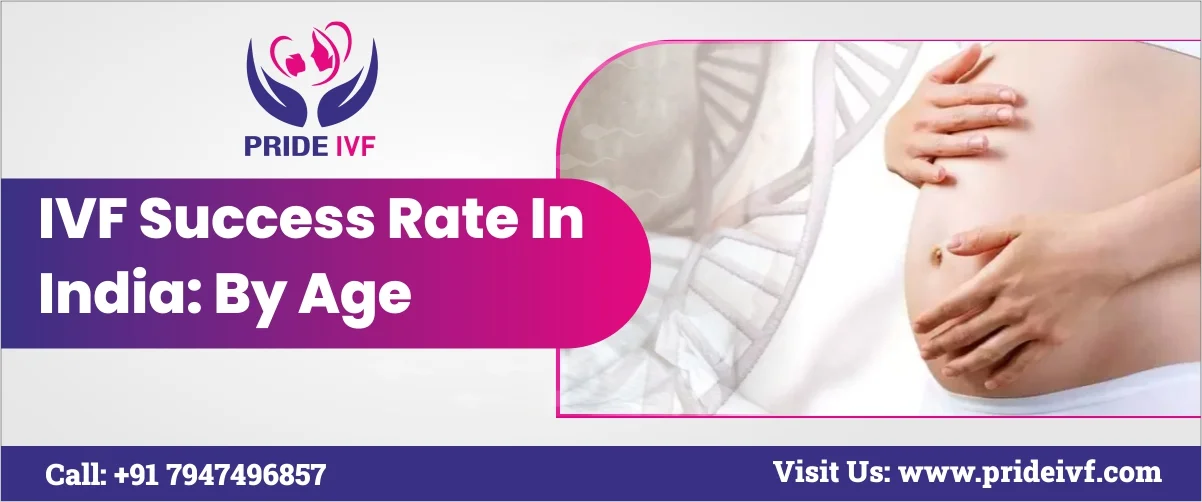The journey to parenthood is a deeply personal and often challenging one. For couples facing fertility issues, In Vitro Fertilization (IVF) has emerged as a beacon of hope. In India, where traditions and modernity often coexist, IVF treatment has gained popularity in recent years.
But what are the factors that influence IVF success rates, particularly when it comes to age? In this blog, we’ll explore the fascinating world of IVF success rates in India, with a specific focus on how age plays a pivotal role. As you embark on your IVF journey, it’s essential to choose the best IVF treatment in Delhi and a trusted IVF doctor to guide you through the process.




Understanding IVF
IVF, or In Vitro Fertilization, is a medical procedure that helps couples struggling with infertility to achieve pregnancy (Also Read: How Is IVF Pregnancy Different From Natural Pregnancy?). It involves a series of steps, including hormonal stimulation, egg retrieval, fertilization in the laboratory, and the transfer of the resulting embryo(s) into the uterus.
IVF treatment often includes a critical component: IVF injection. These injections are a crucial part of the process, aiding in the development and retrieval of multiple eggs for fertilization. The number of injections required can vary from one patient to another, depending on their unique circumstances and treatment protocols.
When embarking on an IVF journey, choosing the best IVF doctor in Delhi is paramount. An experienced and compassionate IVF doctor can provide the guidance and expertise needed to navigate the complexities of IVF treatment.
Also Read: What to Avoid During IVF Injections
Factors Influencing IVF Success
The success of IVF can vary significantly from one individual or couple to another. Along with age and BMI, several factors play a pivotal role in determining the outcome of an IVF cycle. Understanding these factors can help individuals make informed decisions and improve their chances of success:
Underlying Medical Conditions
Certain medical conditions, such as polycystic ovary disease (PCOD), endometriosis, or uterine abnormalities, can affect IVF outcomes. Addressing these conditions before starting IVF can improve the chances of success. Couples often wonder about things i wish i knew before ivf.
Lifestyle Factors
Lifestyle choices, such as smoking, excessive alcohol consumption, and being overweight or underweight, can impact IVF success rates. Adopting a healthy lifestyle by quitting smoking, maintaining a balanced diet, and engaging in regular exercise for infertility can positively influence outcomes.
Previous IVF Cycles
The number of previous IVF cycles a person has undergone can also affect success rates. Multiple failed cycles may indicate underlying issues that need to be addressed.
Clinic and Healthcare Team
The choice of IVF clinic and the expertise of the healthcare team play a crucial role. Researching and selecting a reputable clinic with experienced professionals can significantly impact the success of IVF.
Consulting with a fertility specialist (how to prepare for ivf consultation) can help individuals assess these factors and develop a personalized treatment plan to maximize their chances of achieving a successful pregnancy through IVF.
The Role of BMI and Age
Age isn’t the only factor at play when it comes to IVF success. Body Mass Index (BMI) also has a significant impact, and its influence varies with age.
For those in their twenties and early thirties, maintaining a healthy BMI is crucial. Excess body weight can negatively affect fertility, making it more challenging to conceive both naturally and through IVF. In these younger age groups, a higher BMI can have a pronounced impact on the chances of success.
On the other hand, for women over 35, the impact of being overweight or having a higher BMI is somewhat less significant. However, it’s still important to aim for a BMI within the range of 18.5 to 25 to improve the chances of success during the IVF process step by step.
Lets get started
IVF Success Rates Under 35
Now, let’s focus on the age group that generally enjoys higher IVF success rates—women under 35. This age bracket is often considered the “golden period” of fertility. During this phase of life, women are typically more fertile, and their bodies are more conducive to successful pregnancies.
For women under 35 who have never conceived before, the chances of a successful pregnancy through IVF are around 32%. These statistics rise to 37% if the woman has previously given birth. Although there are few tips for getting pregnant at 30-35. In the early twenties, there’s a 34% chance of IVF success with the added benefit of potentially having two or more children through a single IVF cycle.
Despite these numbers, it’s essential to remember that IVF success rates can vary among individuals. However, data analysis indicates that women under 35 have a 52% chance of achieving pregnancy with just one round of IVF. This is particularly relevant when considering IVF cost in Delhi, as multiple cycles can significantly impact expenses.
IVF Success Rates Over 40
Now, let’s move to the other end of the spectrum—women over 40. In the past, it was considered nearly impossible for women in their forties to conceive. However, with advanced assisted reproductive technology (ART) and IVF treatment, women can now explore motherhood even as they approach menopause.
IVF success rates over 40 are notably different:
- For 40-year-olds, there’s a 20% chance of success in IVF cycles, with a 14% chance of live birth.
- At 41, the odds decrease to 15% for IVF cycles and 10% for live births.
- For those aged 42, it’s a 12% chance for both IVF cycles and live births.
- At 43, the numbers drop further to an 8% chance for IVF success and a mere 3% chance for a healthy delivery.
- For 44-year-olds, there is a 6% chance of IVF resulting in pregnancy and a 3% chance of live birth.
- Lastly, women aged 45 or above face only a 3% chance of pregnancy through IVF treatment and a mere 1% chance of live birth.
These statistics may seem discouraging, but they underscore the importance of considering multiple rounds of IVF treatment for women over 40. Achieving pregnancy at this age often requires perseverance and patience.
For women in this age group, one common question is, “How many injections for IVF treatment will be required?” The answer varies based on individual factors and treatment plans. The doctor will assess your specific needs and determine the appropriate number of injections to optimize your chances of a successful IVF cycle.
Conclusion
In the complex world of IVF, age is undeniably a critical factor. Women under 35 tend to have higher success rates, with the possibility of achieving pregnancy in a single IVF cycle. In contrast, women over 40 face more significant challenges, and multiple IVF cycles may be necessary to achieve their desired outcome.
By considering your age, BMI, and other individual factors, you can make informed decisions that increase your chances of fulfilling your dream of parenthood.
Navigating IVF can be emotionally and financially challenging, but with the right guidance and support, many couples find success in their pursuit of becoming parents. Remember, your unique circumstances may not fit perfectly into statistical data, and there is always room for hope, determination, and miracles in the world of IVF.
For personalized guidance and world-class IVF services, consider reaching out to International Pride IVF Centre, the best IVF centre in Delhi. Your journey toward parenthood is our priority, and we are here to support you every step of the way.




